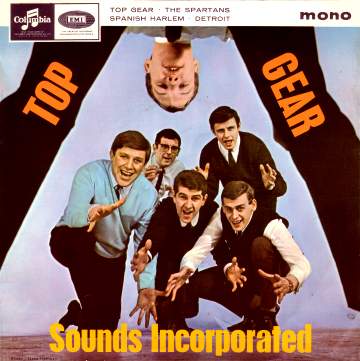|
'Sounds Incorporated' or 'Sounds Inc.' as they became in 1967 were an unusual outfit- the Kentish 'Wall Of Sound'. Not only were they exceptionally skilled musicians by comparison with most of their contemporaries, but their line up was quite different to that generally adopted by most of the groups of their time. They had a very saxophone dominated style that set them apart from the crowd. With the exception of their drummer, Tony Newman who came from north west London, they all came together from Kent's border with the English capital. They soon became renowned in the suburbs of south and east London- notably in Woolwich- for the fullness of their instrumental sound. It was from this reputation that they gained the opportunity to back Gene Vincent on his UK tour of 1961. The success of this tour led to further opportunities to back visiting American artists as well as the chance to record with Parlophone. Sadly, their only record with this label failed to achieve many sales and even a switch to Decca failed to make much impact. It was while they were with Decca that they cut the Duane Eddy sounding 'Keep Moving' and 'Order Of The Keys' with Joe Meek (probably now their most sought after single). However, their reputation at live performances- including in the USA- continued to grow and they came to the notice of the Beatles' manager, Brian Epstein, who offered to act as their agent. Through this association they soon found themselves backing Epstein's stars and can even be heard on the Beatles track 'Good Morning, Good Morning' from the 'Sergeant Pepper' album. They also opened the Beatles legendary show at New York's Shea Stadium. |
|
 |
The EP illustrated on the left is the only one I am aware of issued for the band in the UK during the 1960s. This record takes its title, Top Gear from its title track which was recorded for a late night BBC sound series of the same name and in which the band played in their own right as well as backing other artists. |
| 'Sounds Incorporated's own UK success with singles was very modest in comparison to their reputation as live musicians, but they managed two minor hits while still with Epstein. Their greatest success was actually in Australia where their 'William Tell' went all the way to the #1 spot- despite passing almost unnoticed at home! However, as the 1960s progressed the group began to disintegrate. First off, Tony Newman joined Jeff Beck's group and later went on to work with David Bowie. He was followed by Barrie Cameron who wanted a career in A&R. The rest of the group soldiered on, mainly playing in Australia, until 1971 when they finally broke up to each pursue new musical careers. | |
